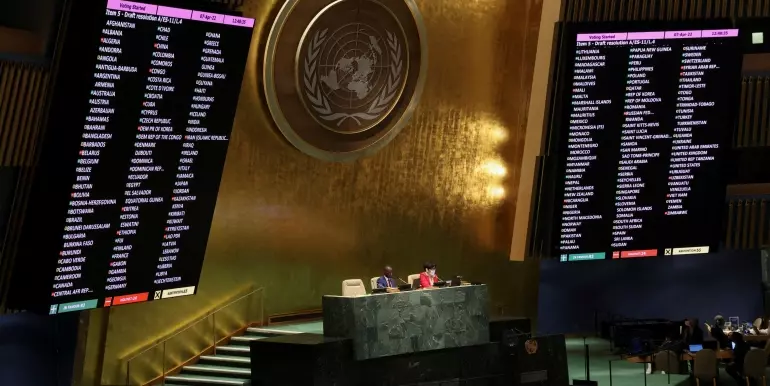The United Nations General Assembly has voted to suspend Russia from the UN Human Rights Council.
A United States-initiated resolution that expressed “grave concern at the ongoing human rights and humanitarian crisis in Ukraine” on Thursday received 93 votes in favour and 24 against, with 58 member states abstaining from the process.
After the vote, Russia announced it was quitting the council.
The resolution came after the discovery of civilian bodies in the town of Bucha near Kyiv, Al Jazeera reports.
The vote, which makes Moscow the first permanent member of the UN Security Council to ever have its membership revoked from any United Nations body, was immediately welcomed by Kyiv but criticized by Moscow.
“War criminals have no place in UN bodies aimed at protecting human rights. Grateful to all member states which supported the relevant UNGA resolution and chose the right side of history,” Ukrainian Foreign Minister Dmytro Kuleba said on Twitter.
For his part, Kremlin spokesman Dmitry Peskov expressed regret about the decision. “We’re sorry about that,” Peskov said in an interview with Britain’s Sky News. “And we’ll continue to defend our interests using every possible legal means,” he said.
Russia had called on an unspecified number of countries to vote “no”, saying an abstention or not voting would be considered an unfriendly act and would affect bilateral relations.
In its so-called “non-paper” obtained by The Associated Press news agency, Russia said the attempt to expel it from the Human Rights Council is a political act by countries that want to preserve their dominant position and control over the world.
That was echoed by Gennady Kuzmin, Russia’s deputy ambassador to the UN, who told a special UNGA session on Ukraine before Thursday’s vote that the US-led resolution “has nothing to do with the human rights situation on the ground”.
South Sudan, Sudan, Kenya, Uganda, Tanzania, Nigeria, and Namibia are among African counties that abstained from the vote.
Sierra Leone, Liberia, Libya, Malawi, Democratic Republic of Congo, and Code D’Ivore voted in favor of the resolution while Burundi, Algeria, Congo, Central African Republic, Ethiopia, Eritrea, Mali, and Zimbabwe were among African countries that voted against the resolution.




